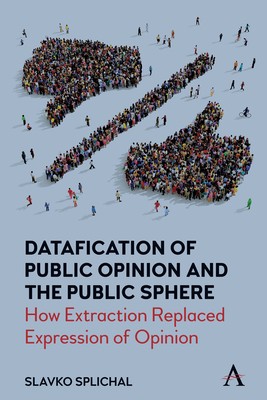
- We will send in 10–14 business days.
- Author: Slavko Splichal
- Publisher: Anthem Press
- ISBN-10: 1839984503
- ISBN-13: 9781839984501
- Format: 15.2 x 22.9 x 1.4 cm, hardcover
- Language: English
- SAVE -10% with code: EXTRA
Datafication of Public Opinion and the Public Sphere (e-book) (used book) | bookbook.eu
Reviews
Description
The book, anchored in stimulating debates on enlightenment ideas of the public that culminated and ended in the early 20th century, focuses on historical changes in the core phenomena of publicness: possibilities, conditions and obstacles to developing a public sphere in which publics create, articulate and express public opinion by means of reflexive publicity within an established democratic public culture. Specifically, it is focused on three central topics:
- a general historical transformation from "opining" - essentially some people's view of what "the public" thought - through the identification of "public opinion" in opinion polls, up to the contemporary establishment of "what people think/want" using computer-based analysis of the big data available from digital records, in which the enlightenment idea of public expression of opinion has been replaced by the technology of extracting opinions; the origins and consequences, and the similarities and differences of the rise and fall of two related concepts - public opinion and the public sphere - in historically particular periods, which have in common that they both lie in the boundary area between normative-theoretical and empirical orientation and suffer from unreliable definition and operationalization, which can only be resolved by a closer connection between the two concepts and areas. a specific historical intervention created by the domestication of the German concept Ãffenntlichkeit in English as "the public sphere," heralding a new critical impetus in theory and research of publicness at a time when critical social thought sharply criticised and even abandoned the notion of public opinion due to its predominantly administrative use.
The book seeks to transcend the division into normative-critical theoretical conceptualisation and "constructive" empirical application in the social sciences to show how critical theory can be empirically applicable and empirical research normatively constructive, and to demonstrate the need for greater connectivity between them.
EXTRA 10 % discount with code: EXTRA
The promotion ends in 16d.02:01:08
The discount code is valid when purchasing from 10 €. Discounts do not stack.
- Author: Slavko Splichal
- Publisher: Anthem Press
- ISBN-10: 1839984503
- ISBN-13: 9781839984501
- Format: 15.2 x 22.9 x 1.4 cm, hardcover
- Language: English English
The book, anchored in stimulating debates on enlightenment ideas of the public that culminated and ended in the early 20th century, focuses on historical changes in the core phenomena of publicness: possibilities, conditions and obstacles to developing a public sphere in which publics create, articulate and express public opinion by means of reflexive publicity within an established democratic public culture. Specifically, it is focused on three central topics:
- a general historical transformation from "opining" - essentially some people's view of what "the public" thought - through the identification of "public opinion" in opinion polls, up to the contemporary establishment of "what people think/want" using computer-based analysis of the big data available from digital records, in which the enlightenment idea of public expression of opinion has been replaced by the technology of extracting opinions; the origins and consequences, and the similarities and differences of the rise and fall of two related concepts - public opinion and the public sphere - in historically particular periods, which have in common that they both lie in the boundary area between normative-theoretical and empirical orientation and suffer from unreliable definition and operationalization, which can only be resolved by a closer connection between the two concepts and areas. a specific historical intervention created by the domestication of the German concept Ãffenntlichkeit in English as "the public sphere," heralding a new critical impetus in theory and research of publicness at a time when critical social thought sharply criticised and even abandoned the notion of public opinion due to its predominantly administrative use.
The book seeks to transcend the division into normative-critical theoretical conceptualisation and "constructive" empirical application in the social sciences to show how critical theory can be empirically applicable and empirical research normatively constructive, and to demonstrate the need for greater connectivity between them.


Reviews